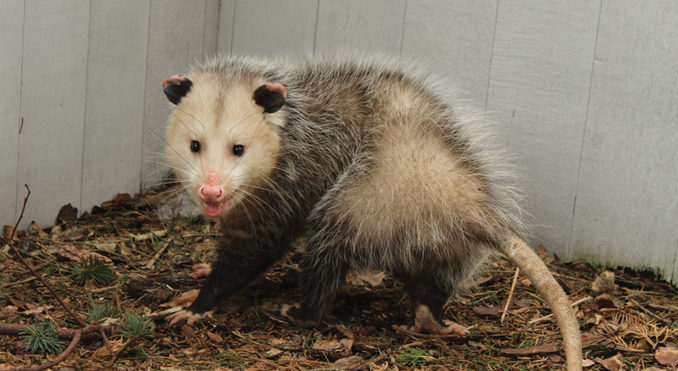
by Dell Cullum

The Virginia Opossum got its name from a Jamestown colony in Virginia, using the Algonquin word “aposoum” meaning “white beast” however, the opossum is hardly a beast at all. In fact, it’s one of our most unique wildlife species in America. Just another example of how fortunate we are on the eastern end of Long Island to share this beautiful landscape with so many awesome wild and marine life species. What makes this mammal unique, is that it’s the only marsupial in North America, north of Mexico, but as you’ll see, that’s not where this critters uniqueness ends.
A marsupial is a mostly nocturnal mammal that carries it’s undeveloped young in a pouch, or a marsupium. Some other marsupials are kangaroos, koalas, wombats and Tasmanian devils. Although Tasmanian devils are very aggressive carnivorous marsupials, their cousin the opossum is quite the opposite. Despite their appearance, which is usually categorized as scary, they are probably the most misunderstood critter we have. The female opossum can have dozens of tiny babies the size of small beans, but the first 13 semi-embryonic babies that reach the available nipples inside the marsupium live. The other do not survive. Mom will carry all thirteen babies in her pouch until they out grown the space and advance onto mom’s back.
Their smile is the first thing most folks remember. Other than the Giant Armadillo who can have as many as 100 teeth, the opossum has the most teeth of any land mammal totaling 50. Opossums are omnivorous and rarely leave any scraps behind after a meal. They enjoy the calcium of both egg shells and bones, so their sharp teeth come in handy for multiple reasons. It is however, that evil smile showing all 50 that is their first line of defense when encountering danger. Hissing and biting is the second line of defense, but if this act of defiance does not persuade the danger to leave, or if a predator actually comes in contact with the opossum, it does something pretty amazing,… it plays dead, hence the often heard phrase, “playing possum”. Incidentally, even though we don’t often pronounce the O in opossum, the real “Possum” is another marsupial found in Australia and different from our “Opossum”.
Playing dead is not a voluntary reaction. It’s a natural state of paralysis called tonic immobility or thanatosis. Insects and animals, including humans (shock) share this reaction however, the opossum displays the condition unlike no other. While playing dead with it’s mouth open excreting saliva, it simultaneously emits a repulsive gaseous oder from its anal scent glands. Makes even the hungriest bear pass in disgust. This shock induced comatose state can last from 40 minutes to 4 hours.
Here’s how the opossum benefits us right here at home, and a few tips to their behavior. They eat lots of rodents and insects. They will eat carrion. They are ferocious tick eaters,.. they LOVE them. They are less susceptible to diseases carried by most other mammals, including rabies. They may seek refuge under a deck, porch or step, but rarely will they cause structural damage to a home. Although they are mostly nocturnal, it is ok to see them during the day without assuming they are sick. Remember, a sick animal will either show clear injury or will walk in circles or stumble. Other than that, they are usually just passing through. Once the young are able to follow behind mom on their own, mom will quickly lose her maternal bond. This results in opossum babies falling into window wells around foundations and getting left behind as momma keeps moving. Opossums are not aggressive animals, but don’t feed them, and enjoy observing from a comfortable distance.
Finally for all the folks who want to get more involved with helping our wildlife, here’s a rescue tip. If you see an opossum lying in the road that has been killed by a vehicle, stop and safely inspect to see if babies have been thrown from the pouch or if the deceased opossums mid section is moving. If it’s a female with babies, DO NOT remove the babies from the pouch. The babies swallow the entire nipple and pulling them off incorrectly could damage the baby’s stomach. Rather put mom’s body carefully into a box or carry all. Look around for any babies ejected from the pouch and put them on top of the mother, while quickly contacting a rehab facility (listed below). There’s a good chance you’ll be saving the surviving babies.
Love Wildlife. It Matters.
~ Dell Cullum
Evelyn Alexander Wildlife Rehab and Rescue: 631-728-WILD
Hampton Wildlife: 631-377-6555

